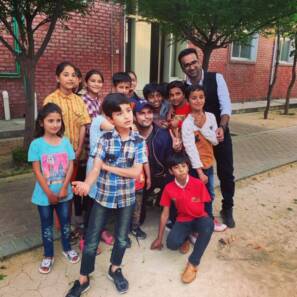Disclaimer*: The articles shared under 'Your Voice' section are sent to us by contributors and we neither confirm nor deny the authenticity of any facts stated below. Parhlo will not be liable for any false, inaccurate, inappropriate or incomplete information presented on the website. Read our disclaimer.
This story has been written by Dr. Ali Jawaid.
Research effort involving Pakistani neuroscientist Dr. Ali Jawaid has identified a role for metabolic factors in transmitting the effects of traumatic experiences from parents to children.
[adinserter block= “3”]
He is heading the Laboratory for Translational Research in Neuropsychiatric Disorders (TREND) at the BRAINCITY Center of Excellence for Neural Plasticity and Brain Disorders in Warsaw, Poland.
Dr. Jawaid’s old work showed how adverse exposures in the early life of parents can cause psychological and metabolic perturbations in the children.
Dr. Jawaid and his colleagues have now explained that some chemicals transmit these effects. They called them metabolites in the blood of parents. These include chemicals released by the brain, liver, and other organs that can be detected in the blood.

Early life trauma in a mouse model
A team of scientists first studied early life trauma in a mouse model. A newly born mouse pups face separation from their mothers. Stressed mothers raised them, similar to many cases of childhood trouble in humans. Scientists found out that this traumatic exposure affects many metabolites, especially fatty acids in the blood. Many of these changes persist until the adulthood of these mice as signatures of trauma.
They further show these changed fatty acids make their way to the sperm cells. They then change the activity of an important regulator of gene expression.
When the offspring is born, it has changed metabolic makeup. It responds atypically to periods of high sugar intake or starvation. The team also injected the blood taken from the traumatized mice into regular ‘control’ mice. They saw it repeated the effects of trauma. Thus, proved that blood chemicals are mediators of a unique form of ‘trauma transmission’. This transmission occurs from parents to children.
The most notable aspect of the study is its relevance to humans. The major part of the study is done in Switzerland. For the human part, Dr. Ali Jawaid traveled to Pakistan and collaborated with the SOS Childrens’ villages.

He worked with a team of dedicated students there. Dr. Jawaid studied children who had endured early life trauma in the form of paternal demise and maternal separation. They had similar chemical changes in their blood.
The changes in the chemicals also correlated with symptoms of depression. Important0ly, this study also led to the identification of many physical and psychological disturbances in these children. To deal with them, therapies have already been initiated.
[adinserter block= “4”]
This research is ground-breaking. It identifies a way that can be targeted to stop the transmission of inter-generational trauma. It is an important concept considering global conflicts, violence against children, and movements such as Black Lives Matter.
What do you think of this story? Let us know in the comments section below.







